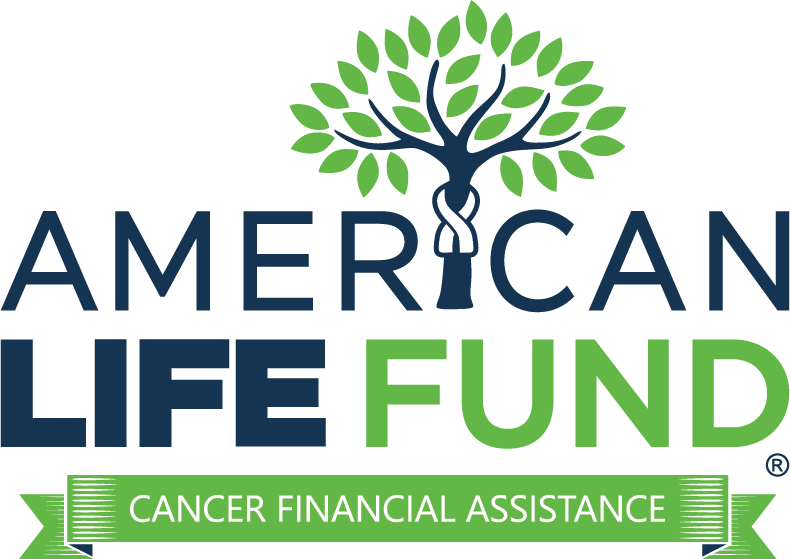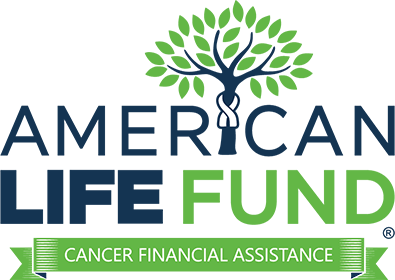If you’re facing cancer treatment without insurance, there are options that can help manage the costs. Explore health insurance through Medicaid, Medicare, or state marketplaces for potential coverage. Organizations like the American Cancer Society and Patient Advocate Foundation offer financial support and guidance. Consider life or viatical settlements for immediate funds. Negotiate medical bills, opt for generic medications, and use free screening services to reduce expenses.
In this blog post, we’ll explore various aspects of coping with cancer treatment without insurance, including understanding the financial burden, exploring insurance options, finding assistance programs, reducing out-of-pocket expenses, and utilizing the support of oncology social workers.
Our goal is to provide you with the information and guidance necessary to make informed decisions and take control of your cancer treatment without insurance journey.
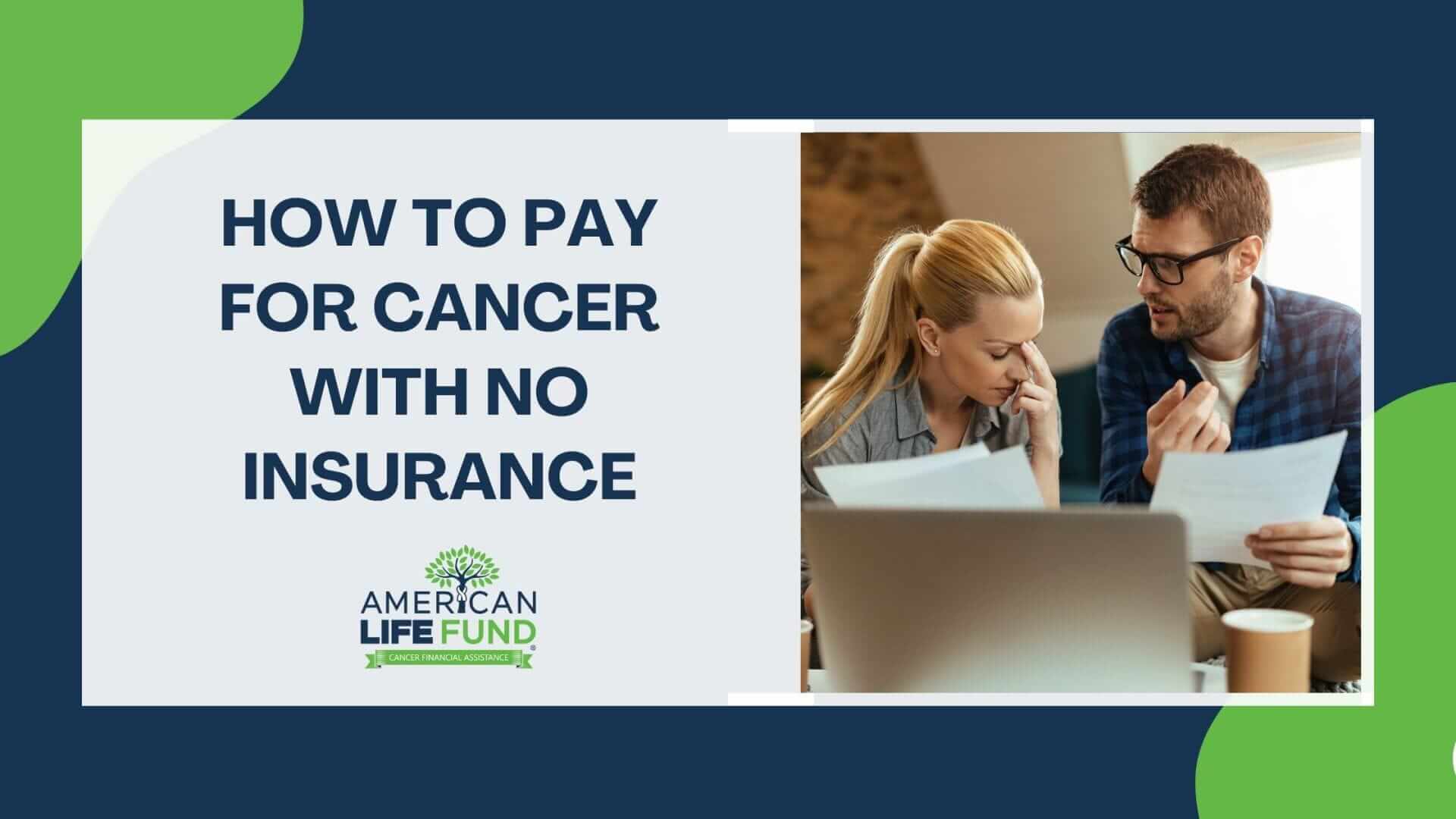
Key Takeaways
- Cancer treatment can be financially overwhelming, particularly for those without health insurance.
- Uninsured patients can explore various coverage options and assistance programs to reduce out-of-pocket expenses associated with cancer treatment.
- Oncology social workers provide invaluable insurance assistance and emotional support for uninsured cancer patients.
The Reality of Cancer Treatment Costs
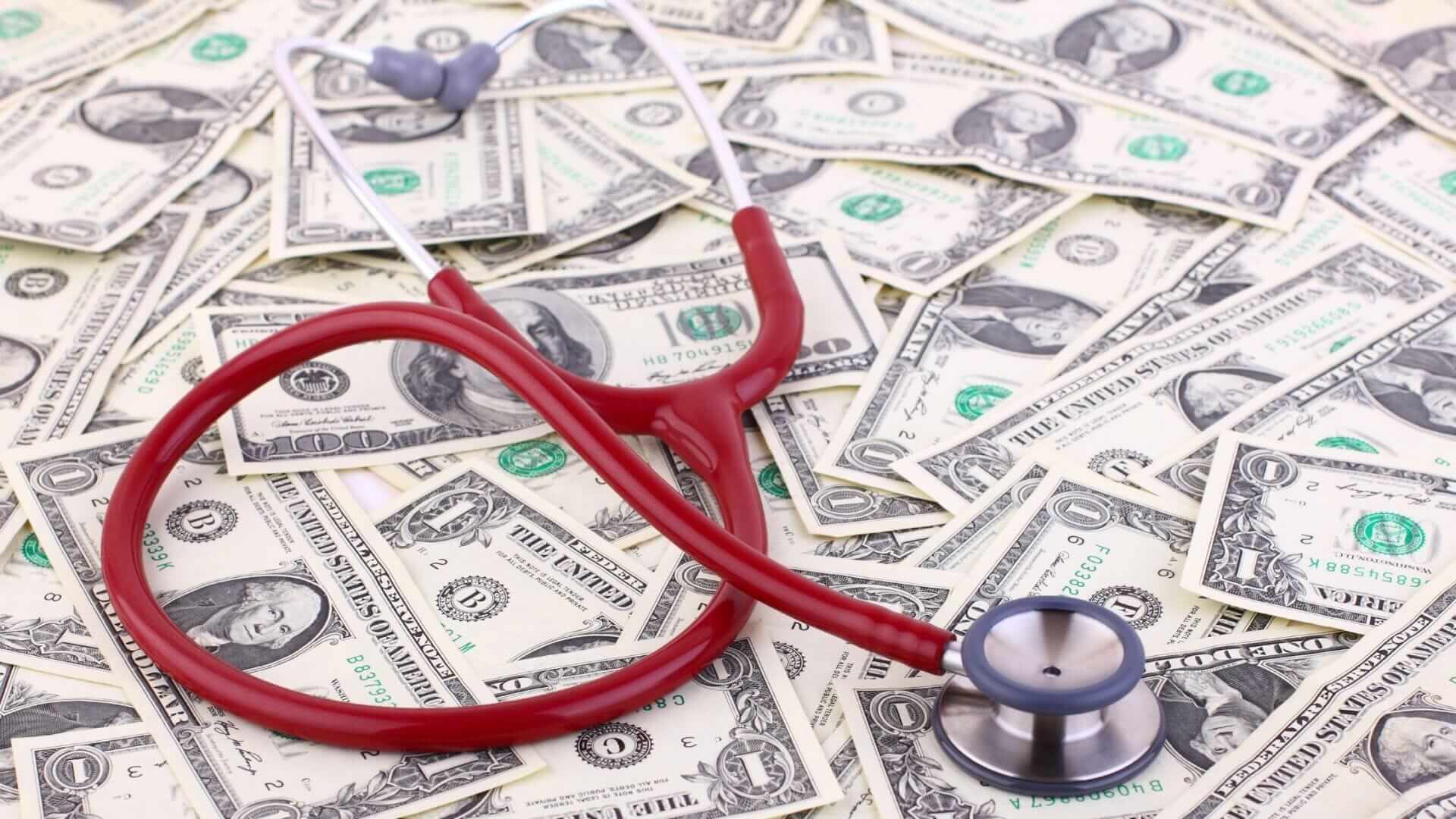
The financial burden of cancer treatment can be overwhelming for uninsured patients and their families. A cancer diagnosis can lead to significant direct costs, such as medical bills, and indirect costs, such as lost income. The lack of health insurance coverage can be detrimental to individuals battling cancer. Inquiring about financial counseling after a cancer diagnosis is highly beneficial, as it aids in managing the billing and insurance process and out-of-pocket expenses.
Factors influencing the costs of cancer treatment include:
- Age
- Gender
- Race/ethnicity
- Health insurance status
- Income
- Location
Choosing the right health insurance plan can help alleviate some of these costs, but without insurance, the financial strain on families can be immense. We will examine the costs associated with cancer treatment and its financial strain on families.
Direct and Indirect Costs
Cancer treatment may involve various expenses, including:
- Medical bills
- Transportation costs
- Lost income
- Fees for specialists
- Prescriptions
- Fees for equipment, facilities, and labs
The total cost of cancer treatment is estimated to be around $150,000, but the actual cost may vary depending on the type of cancer and the stage of treatment. Access to affordable health care options can help reduce the financial burden on patients and their families.
Transportation costs can create additional financial strain on cancer patients and their family members, as they often need to travel to medical facilities for treatments, appointments, and follow-up visits. Specialist consultations for cancer treatment may also vary in cost, with medical consultations and in-hospital care in high-income countries estimated to be between USD 40-71. However, these costs can be higher depending on the type of treatment and healthcare provider.
Financial Strain on Families
Families undergoing cancer treatment commonly experience the following:
- Mounting cancer-related expenditures and reduction in wealth
- Anxiety and discomfort caused by the financial burden
- Financial hardship, even for those with insurance
- Disproportionate impact on younger and socioeconomically disadvantaged patients
The average cost of cancer treatments in the United States without insurance can range from approximately $1,000 to $20,000 annually, but the costs may vary depending on the type of cancer and the required treatment.
Younger and socioeconomically disadvantaged patients are more likely to experience financial hardship when it comes to cancer treatment, as they are more likely to lack insurance and have fewer resources to draw upon. This can lead to:
- Difficulty in affording cancer care and making treatment decisions
- Long-term financial problems for cancer survivors
- An increased risk of significant financial hardship for the family when a loved one develops cancer.
To alleviate this burden, various strategies can be employed to reduce out-of-pocket expenses, such as negotiating medical bills, utilizing generic or alternative medications, and taking advantage of free or low-cost screening services.
Exploring Health Insurance Options

For uninsured cancer patients, securing health insurance may pose a significant challenge. However, options are available, including Medicaid, Medicare, and state health insurance marketplaces. Evaluating these options allows cancer patients to find affordable health care services and medical care to help cover their treatment costs.
Each health insurance option has its eligibility criteria and coverage details, so it’s important to comprehend each option to determine what best fits your needs. The subsections below offer a more detailed look into Medicaid, Medicare, and state health insurance marketplaces, highlighting their benefits and how they can assist uninsured cancer patients.
Medicaid
Medicaid is a health insurance program that provides free or subsidized plans to many Americans. The states administer this program. To be eligible for Medicaid, cancer patients must meet certain income and family size requirements, and some states have specific programs for breast and cervical cancer patients, which provide full Medicaid benefits for treatment. Cancer patients can contact their state’s Medicaid program or complete an application through the Marketplace to apply for Medicaid.
Medicaid coverage for cancer treatments varies by state, but it generally provides similar care to basic private health insurance. This includes medications approved by the FDA, such as chemotherapy and immunotherapy. Eligible cancer patients can significantly reduce their out-of-pocket expenses and access the necessary care by obtaining Medicaid coverage.
Medicare
Medicare is a health insurance program for individuals aged 65 or above or those who have been determined disabled by the Social Security Administration for two years. It provides coverage for cancer treatment through both Part A and Part B. Part A covers inpatient hospital care related to cancer treatment, while Part B covers medically necessary cancer-related outpatient services and treatments, including chemotherapy and radiation therapy.
To apply for Medicare, individuals can complete an application online through the Social Security website, contact Social Security at 1-800-772-1213, or submit an application in person. The initial enrollment period begins three months before the month of your 65th birthday and ends three months after the month of your 65th birthday. By enrolling in Medicare, older cancer patients without insurance can access the coverage they need for their treatment.
State Health Insurance Marketplaces
State Health Insurance Marketplaces are online platforms providing individuals and small businesses with affordable health coverage. Established under the Affordable Care Act, these marketplaces offer a “one-stop shopping” experience for finding and purchasing health insurance plans. Depending on the state, the marketplace may be operated by the state government, the federal government, or a combination of both.
Uninsured cancer patients can access coverage through State Health Insurance Marketplaces by visiting www.healthcare.gov and selecting their state’s Marketplace. They can obtain insurance plans through the Marketplace, which may include coverage for cancer treatment. By exploring these options, uninsured cancer patients can find the coverage they need to help manage their health care costs.
Assistance Programs and Resources
In addition to exploring health insurance options and supplemental cancer insurance, uninsured cancer patients can access a range of assistance programs and resources to help cover their treatment costs. These resources include:
- The American Cancer Society
- Patient Advocate Foundation
- Local community organizations
- Life and viatical settlements
These programs and resources, provided by health and human services, are vital in supporting uninsured cancer patients and their families by offering financial assistance, emotional support, and guidance on navigating the healthcare system.
The following subsections will elaborate on these assistance programs and resources, detailing their benefits and services for uninsured cancer patients.
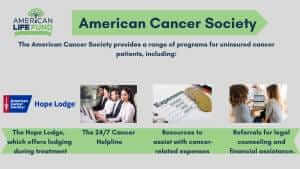
American Cancer Society
The American Cancer Society provides a range of programs for uninsured cancer patients, including:
- The Hope Lodge, which offers lodging during treatment
- The 24/7 Cancer Helpline
- Resources to assist with cancer-related expenses
- Referrals for legal counseling and financial assistance.
Connecting with the American Cancer Society enables uninsured cancer patients to access critical support and resources to assist them through their cancer journey.
Patient Advocate Foundation
The Patient Advocate Foundation assists uninsured cancer patients through financial assistance through their Financial Aid Funds. Patients can access this assistance by calling (855) 824-7941 or applying online. Additionally, they have disease-specific health equity funds available for eligible patients in certain counties.
Reaching out to the Patient Advocate Foundation allows uninsured cancer patients to receive the financial support necessary to manage their treatment costs.
Local Community Organizations
Local community organizations that offer support for uninsured cancer patients include:
- The SamFund
- CFAC (Coalition for Cancer Financial Assistance)
- CancerCare
- The Leukemia & Lymphoma Society
- The Joe Andruzzi Foundation
These organizations may provide financial assistance for medical bills, transportation, lodging, child care, home care, and other cancer care costs not covered by health insurance.
Connecting with these organizations enables uninsured cancer patients to discover more resources and support to assist in managing their healthcare costs.
Life and Viatical Settlements
Life and viatical settlements are financial options that can assist cancer patients without health insurance. A viatical settlement involves the sale of a life insurance policy to generate income. This can provide cash for individuals who require financial assistance while undergoing cancer treatment.
Selling their life insurance policy through a viatical settlement company instead of an insurance company enables cancer patients to access funds to support their medical needs and alleviate some of the financial burden associated with treatment.
Strategies for Reducing Out-of-Pocket Expenses

Uninsured cancer patients can employ various strategies to minimize their out-of-pocket expenses and reduce the financial burden of treatment. These strategies include negotiating medical bills, opting for generic or alternative medications, and using free or low-cost screening services.
By implementing these cost-saving measures, uninsured cancer patients can better manage their healthcare costs and focus on recovery.
This section will provide more detailed information about these strategies and practical tips and guidance for reducing out-of-pocket expenses associated with cancer treatment.
Negotiating Medical Bills
When negotiating medical bills for cancer treatment, it is essential to take a proactive approach and communicate your financial situation with your healthcare provider. By discussing your financial concerns with your provider before receiving any services, you can potentially negotiate lower costs or payment plans to help manage your medical expenses.
Additionally, a medical bill advocate can provide comprehensive assistance in:
- Understanding insurance coverage
- Identifying potential medical and non-medical costs
- Negotiating with healthcare providers for discounts or payment plans.
Seeking Generic or Alternative Medications
When seeking generic or alternative medications for cancer treatment, consulting with your healthcare provider or oncologist is essential to obtain information on generic options or alternative treatments.
Generic medications offer substantial cost savings compared to brand-name drugs, with prices that are typically 80-85% lower. By opting for generic or alternative medications, uninsured cancer patients can receive quality care without the burden of high costs.
Utilizing Free or Low-Cost Screening Services
Uninsured patients may have access to several free or low-cost cancer screening services, such as:
- The CDC’s National Breast and Cervical Cancer Early Detection Program (NBCCEDP)
- Planned Parenthood
- State and local health departments
- NeedyMeds
These organizations offer reduced prices or free medical care to income-eligible individuals.
By utilizing these preventive services, uninsured cancer patients can access essential screening and early detection services at little to no cost.
The Role of Oncology Social Workers

Oncology social workers play an important role in supporting uninsured cancer patients by assisting them in researching their insurance options, accessing available resources, and providing emotional support and counseling. Their expertise and guidance can be invaluable in helping patients navigate the challenges of cancer treatment without health insurance.
This section will detail the specific services provided by oncology social workers, including insurance navigation assistance and emotional support and counseling, and discuss how these professionals can positively impact the lives of uninsured cancer patients.
Insurance Navigation Assistance
Oncology social workers offer support and guidance to individuals in understanding health insurance questions, addressing concerns about cancer care costs, and navigating the healthcare system. They assist in enrolling in health insurance plans that provide better coverage and accessing human services resources for financial assistance.
By working with an oncology social worker, uninsured cancer patients can better understand their insurance options and access the resources they need to manage their healthcare costs.
Emotional Support and Counseling
In addition to assisting with insurance navigation, oncology social workers provide a range of services for uninsured cancer patients, including:
- Emotional support and counseling
- Help with managing the practical and emotional aspects of cancer care
- Counseling and education
- Spiritual support
- Facilitating group support
- Connecting patients with other services and resources that may be beneficial
By accessing the support of an oncology social worker, uninsured cancer patients can better cope with the emotional challenges of their cancer journey and find the strength and resilience they need to face their treatment.
How to Pay For Cancer With No Insurance Summary
Coping with cancer treatment without health insurance can be an incredibly challenging experience, both emotionally and financially. However, there are resources and strategies available to help uninsured cancer patients navigate this difficult journey. By exploring health insurance options, accessing assistance programs and resources, implementing cost-saving strategies, and utilizing the support of oncology social workers, uninsured cancer patients can find the help they need to manage their healthcare costs and focus on their recovery.
In the face of a cancer diagnosis, it’s essential to remember that you are not alone. There is support available to help you through this challenging time. By taking advantage of the resources and strategies shared in this blog post, you can empower yourself to take control of your cancer treatment journey and find hope in the face of adversity.
How do you get cancer treatment if you can’t afford it?
If you cannot afford cancer treatment, inquire about charity care and sliding-scale programs at hospitals and clinics. You can also look into the Cancer Financial Assistance Coalition (CFAC) for a searchable database of financial resources and CancerCare for limited assistance with co-pays and other needs.
Can you be denied chemo if you don’t have insurance with a cancer diagnosis?
No, you cannot be denied cancer treatment without insurance; grants and prescriptions are available at no or little cost.
What can a cancer patient get for free?
Cancer Alliance of Help & Hope provides cancer patients with gift cards to help them cover everyday expenses while undergoing treatment.
Are there any government programs that provide health insurance coverage for cancer treatment without insurance?
Yes, government programs provide health insurance coverage for cancer patients, such as Medicaid and Medicare. Medicaid is a state-run program offering free or low-cost plans, while Medicare is a federal program for those aged 65 or above or those who have been disabled for two years.
What resources can help me find affordable cancer treatment options?
Exploring health insurance options and resources such as the American Cancer Society, Patient Advocate Foundation, local community organizations, and life and viatical settlements can help you find affordable cancer treatment options.
